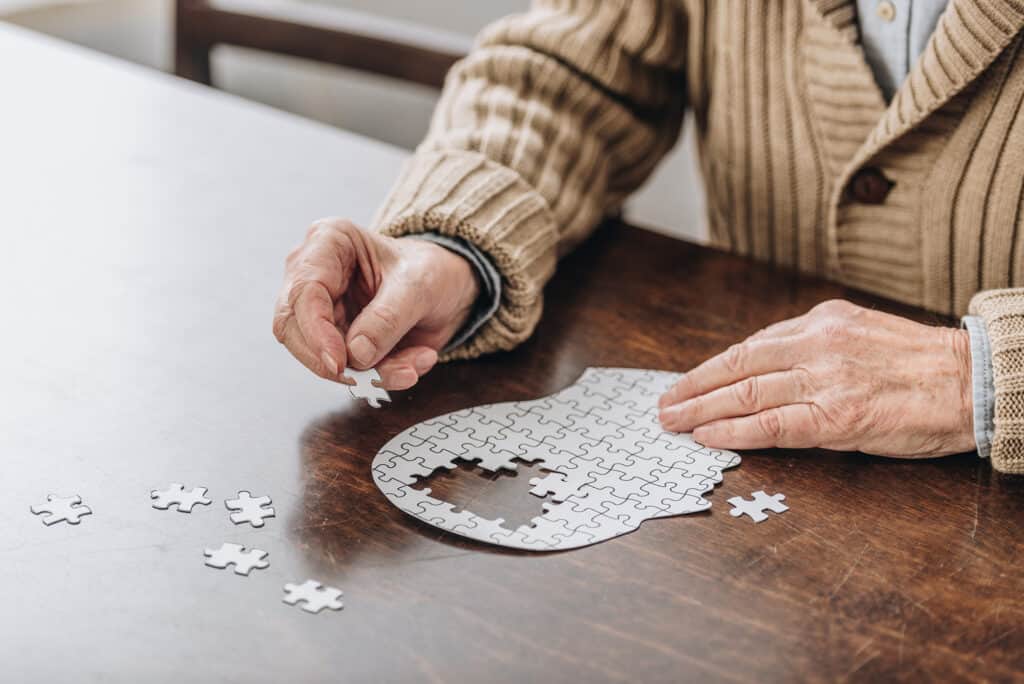Currently, over 55 million people around the world are suffering from dementia. In addition, there are nearly 10 million new cases of dementia each year. Is your loved one one of these new cases? Read on to learn about dementia and its symptoms. You’ll also learn how to care for a loved one who’s suffering from dementia and find the right senior living community.
What Is Dementia?
The terms “dementia” and “senility” are often used interchangeably. However, the terms are not the same. People use the latter term to wrongly imply that mental decline is a normal part of aging. “Dementia” refers to a range of specific medical conditions. These occur in seniors, but not all seniors fall victim to one or more of these diseases. All the diseases under the dementia umbrella have one thing in common: abnormal brain changes. These can cause a sharp decline in cognitive abilities and can make people struggle to control their behavior and feelings. People with dementia can also struggle with performing average daily life activities. At these diseases’ most severe stages, a person can become completely reliant on others for feeding, bathing, etc.
What Causes Dementia?
In normal conditions, the human brain’s nerve cells (neurons) send messages to each other. This allows the human brain to function. Consequently, it allows a person to think and act normally. With dementia, the connections between neurons break down. Researchers have yet to learn why these breakdowns occur in some individuals but not others. They’ve discovered some rare genetic variants that seem to cause dementia, but not much else.
What Are the Symptoms of Dementia?
Dementia symptoms can seem to start subtly. This is unfortunate, as treatment needs to start as soon as possible to slow the decline. Also, depending on the types of dementia a loved one experiences, the signs and symptoms can vary. As your loved one gets older, keep a close eye on them.
Consider seeing a memory care specialist if you catch your loved one experiencing some of the following symptoms:
- Makes impulsive actions
- Repeats his or her questions
- Gets lost in familiar places
- Has poor judgment
- Experiences memory loss
- Gets confused easily
- Struggles to speak, read, or write
- Calls familiar objects by unusual words
- Takes a longer time to complete daily tasks
- Loses his or her balance often
- Struggles to move
- Loses interest in doing normal activities
- Experiences paranoia and/or delusions
- Struggles to handle money responsibly and pay bills
- Feels unempathetic toward other people
What Are the Types of Dementia?
Most people likely know about Alzheimer’s, which is the most common type of dementia disease. However, it is not the only one.
Alzheimer’s Disease
This disease mostly affects people who are 65 and older. Experts suspect that this disease is caused by buildups of amyloid plaques and tau tangles. These are abnormal proteins that may kill neurons and block communications.
Frontotemporal Dementia
This type of dementia is rare and often starts in people younger than 60. Most of the cognitive damage occurs in the frontal and temporal lobes of the brain, hence the name. Experts have found abnormal amounts of tau and TDP-43 proteins in these patients.
Lewy Body Dementia
Lewy body dementia can affect adult individuals as young as 50. Patients who suffer from this form of dementia have deposits of alpha-synuclein proteins in their brains. Experts also call these proteins Lewy bodies.
Vascular Dementia
Proteins are not the cause of this type of dementia. Rather, it is caused by conditions that interrupt the flow of blood and oxygen to the brain. Strokes often precede the manifestation of this type of dementia.
Mixed Dementia
A person who experiences mixed dementia shows the symptoms of one or more types of dementia diseases. Unfortunately, it can often be difficult for medical experts to diagnose mixed dementia.
What Can a Person Do to Prevent Dementia?
There is no surefire way to prevent dementia. Furthermore, such risk factors like age and genetics, cannot be fixed. However, research does suggest that healthy life choices can prevent the onset of dementia. These include eating a healthy diet, getting regular exercise, and not smoking.
What to Do if You Suspect Your Loved One Has Dementia
If you suspect that your loved one has dementia, your first step should be to get them to a doctor. The doctor can diagnose and offer some possible forms of treatment. Beyond that, acting as a caregiver or finding a caregiving service is best.
How a Doctor Diagnoses Dementia
Doctors cannot give a single test to diagnose someone with dementia. They diagnose mostly by analyzing medical records, giving an examination, and noting changes in behavior and functioning. It’s also often difficult for doctors to diagnose particular types of dementia. Often, a doctor will just describe a patient as having dementia.
Dementia Treatment
Unfortunately, doctors cannot cure dementia. However, certain medications can reduce or slow cognitive and functional decline. Non-drug therapies can also be a great help to individuals experiencing dementia.
Caregiving
After a dementia diagnosis, it often falls on a relative to provide proper caregiving to their loved one. This can be an intense process, but there are many resources available that can help. If things get to be too much, however, you may want to consider moving your loved one into a memory care community.
Assisted Living
Certain types of assisted living and memory care communities can provide high-quality care for dementia patients. Do you want to place your loved one in a senior living community? If so, choose one that can provide the level of care your loved one needs.
Our Senior Living Community Provides Memory Care
All hope is not lost when your loved one receives a dementia diagnosis. Though the research isn’t entirely complete, researchers have still developed plenty of methods for treating dementia patients. The process can be a lot easier than you think. Also, if your loved one needs memory care, consider placing them in our senior living community. We serve everyone’s moms and dads as if they were our own. To get more information, fill out the form on this page.




